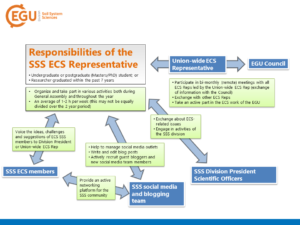
Early career scientist representatives are a crucial link between the EGU and the early career scientist community. They are vital in providing feedback from students and early career researchers so that we can take action to improve our early-career scientist’s activities at the EGU General Assembly and maintain our support for early-career scientists throughout the year. The ECS website brings together the opportunities the EGU offers for early career researchers – useful resources, job opportunities and information on how you can get involved in the Union.
In our division, we are looking for a new Early Career Scientist (ECS) Representative. This is a great opportunity, but you may have some questions like: What does this mean? What are the tasks of the ECS Division Representatives? Who are we looking for? And most importantly – how do I apply?!
But, let’s start from the beginning: what is an ECS Representative?
The ECS Representative is a person who facilitates the crucial connection between ECS members and, more generally, between the ECS members and EGU itself. Half of EGU’s members qualify as an ECS, meaning they are within 7 years of their PhD graduation. Each ECS Representative is voted in by their community during the Division programme group meetings at the General Assembly (GA) in Vienna and holds an important place in the Division for two years. The ECS Representative makes sure that the wishes and needs of the ECS in their division are being heard and conveyed to the decision-makers of EGU. As the ECS Representative of your Division, you will be the most visible point of contact for most ECS and will be able to effect change within your Division on their behalf.
Okay then, so what does being an ECS Representative encompass?
The most important task of the ECS Representative is to listen to the ECS members of their Division and voice the problems, challenges and suggestions they have to the Division President and/or Scientific Officers. This feedback can also be fed upwards through the Union-wide ECS Representative to the EGU Council.
The tasks of the ECS Representative vary by Division, but all ECS Representatives take part in the bi-monthly inter-divisional meetings led by the Union-wide ECS Representative. During these meetings, information is exchanged that is either directed to the Council (for example, to request a change of policy) or comes from the Council (for example, to receive more information about new ECS plans). In addition to the meetings at inter-divisional level, most ECS Representatives work in a team with other ECS to motivate and include the ECS of their Division with EGU more generally, through activities during the GA, writing blogs or managing social media outlets. The ECS Representative is encouraged to actively recruit people to join their team. On average the workload of an ECS Representative is 1-2 hours per week, but this is not equally divided over the year, especially around the General Assembly it can get quite busy.

The diverse tasks and active roles that an ECS rep. play within the EGU structure, in a nutshell (click to zoom in).
Am I eligible?
The ECS representative position is open to anyone who:
- is an undergraduate or postgraduate (Masters/PhD) student, or a researcher who has received their highest degree (BSc, MSc, or PhD) within the past seven years (remember, there is an inclusion of parental leave in this category: up to one year of parental leave time may be added per child, where appropriate).
- is willing to take on the tasks that come with the position seriously and has good organizational skills
- is committed to get involved in the soil sciences research community (particularly at EGU)
- Additionally, it’d be preferred if you have an interest in or experience with social media and policymaking, but these are absolutely not essential.
Okay, you got me: how do I apply?
Great! If you’re interested, you need to send an email with your CV and a one-page motivation letter about why you would like to take up this position and what you want to achieve during your time as the ECS Representative (app. 300 words) to sss@egu.eu by 31st March 2020.
If you need any more information, you can check https://www.egu.eu/ecs/, or contact current ECS-SSS representative, Steffen Schweizer (Tw:@GeoScheweizer, ecs-sss@egu.es) and/or union-level ECS representative Raffaele Albano (Tw: @raffalba85, ecs@egu.eu). Also, you can get in touch with us via Twitter.
We look forward to receiving your application!
